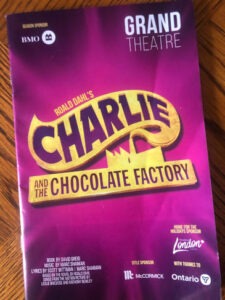
Charlie And The Chocolate Factory At The Grand Theatre
The continued existence of Charlie and the Chocolate Factory, a musical based on a 1964 children’s novel by Roald Dahl, bewilders me. When it premiered in London in 2013, discerning critics roundly panned it. It has gone through several iterations since but the book by David Greig, music by Marc Shaiman, and lyrics by Shaiman and Scott Wittman doesn’t seem to have improved appreciably, despite the addition of songs by Leslie Bricusse and Anthony Newley from the film Willy Wonka & the Chocolate Factory.
Yet Charlie and the Chocolate Factory has had a robust afterlife as a “classic” of children’s theatre, perhaps because it allows companies with Broadway-sized budgets to create a lot of scenic razzle-dazzle.
Now the Grand Theatre in London, Ontario, is giving this not very good musical, based on problematic source material, a not very good production that wears its threadbare scenic budget on its sleeve.
The show’s hero is young Charlie Bucket, played very nicely at the performance I saw by Neela Noble, who alternates in the role with Greyson Reign Armer, perhaps in a bid to ensure gender equity.
Bucket lives in soul-grinding poverty in a household that includes all four of his grandparents. In one of the few nice touches in this Charlie and the Chocolate Factory the Bucket home is represented by a large, rolling rectangular set piece that features a raised platform in which all four grands share a large bed, a conceit perhaps borrowed from Beckett.
Charlie longs for chocolate bars from the firm of the mysterious Willy Wonka whose factory is a fortress shrouded in secrecy. Wonka has announced a promotion in which five “Golden Tickets” will be distributed world-wide in his chocolate bars. Alas, such is the penury of the Bucket clan that Charlie only gets one chocolate bar a year.
To make a long story short (the entire first act is consumed with ponderous exposition), Charlie ends up with the fifth and final Golden Ticket and entree to a guided tour of the factory let by none other than Willy Wonka himself. Wonka presides over a veritable wonderland of candy-making machinery operated by the Oompa-Loompas, a diminutive race of what appear to be in this production sub-human mutants who are held in virtual slavery. What wonderful fun for today’s children!
It turns out that the other four Golden Ticket holders are insufferable brats of one sort or another, each of them accompanied by an equally unpleasant parent. In the novel all get their comeuppance in darkly amusing ways. In the musical, some are dismembered and one is shrunk to voodoo doll size and taken home in his mother’s purse. In what universe is this supposed to be children’s entertainment?
Now in fairness, after each child is dealt with, the chorus of Oompa-Loompas sings a “moral of the story” song. Unfortunately, in director Jan Alexandra Smith’s production, the lyrics are indecipherable.
The very decent Charlie is the last child standing as it were and it appears that the whole Golden Ticket promotion was a ruse to help Willy Wonka find the person to whom he was going to bequeath his factory. How he hoped to pull this off on the basis of five randomly distributed Golden Tickets is never explained. I suppose strict Aristotelian logic is not to be expected in a children’s show, but still . . .
But the worst part of this Charlie and the Chocolate Factory is the criminal underutilization of the prodigious talents of Mark Uhre who plays Willy Wonka. This is the second time this has happened at the Grand, the last being in a production of Mary Poppins in 2019.
While the delightfully loose-limbed Uhre gives ample evidence of what might have been possible, choreographer Robin Calvert hasn’t seen fit to create a number (or two, or three) that would have allowed Uhre to put his abilities as an eccentric dancer on full display. Donna Feore didn’t make the same mistake in her 2017 production of Guys and Dolls at the Stratford Festival in which Uhre made the minor role of Benny Southstreet into one of the most memorable in the show.
At least costume designer Joseph Abetria gave Uhre a smashing costume for Act Two (he spends Act One in disguise as a dyspeptic chocolate shop owner).
Now that I think of it, it’s rather surprising that Charlie and the Chocolate Factory or any show connected with Dahl is being done in this day and age. For starters, Dahl was a rabid and unrepentant antisemite. In the original novel the Oompa-Loompas were a diminutive race of Africans held in slavery (although the musical doesn’t make this connection).
Perhaps most damning of all in today’s catalog of culture-war sins, Irish critic Una Mulally accused Dahl of “crude and often disturbing sexual fantasy writing” in his short stories.
Where’s cancel culture when you need it?
Charlie and the Chocolate Factory continues at the Grand Theatre through December 24, 2023. For more information and to purchase tickets visit the Grand Theatre website.
More Reviews
To access the complete archive of reviews listed alphabetically CLICK HERE.
Don’t miss another review or blog post! SUBSCRIBE HERE.

